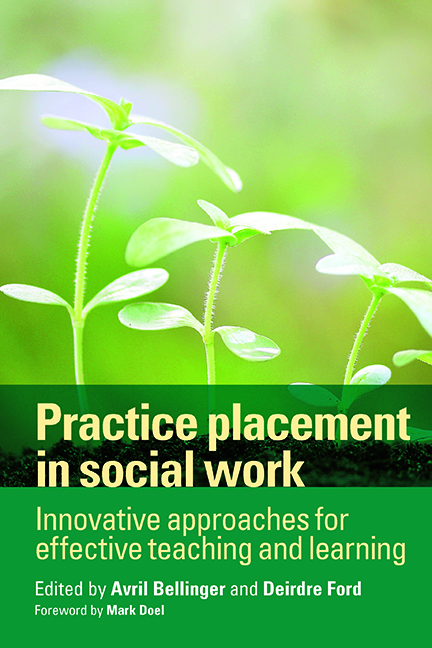Book contents
- Frontmatter
- Dedication
- Contents
- Foreword
- Notes on contributors
- Introduction
- One Student-led services
- Two International placements: learning from a distance
- Three The outside looking in – an independent social worker’s experience of practice educator work
- Four ‘Do you have to be white to pass this course?’ Developing support for black and minority ethnic students in a predominantly white area
- Five Men in social work education: building a gendered alliance
- Six Hidden in plain sight: use of an arts-based method for critical reflection
- Seven Getting our hands dirty: reconnecting social work education as if the earth matters
- Eight Social media for students in practice
- Nine Developing placement capacity in the third sector
- Ten Observations of student practice: what difference does observer qualification make?
- Eleven Filling the gap: constructive responses to the erosion of training standards for practice educators
- Twelve The concept of integrity in relation to failing and marginal students
- Thirteen Cultivating discretion: social work education in practice and the academy
- Index
Introduction
Published online by Cambridge University Press: 01 September 2022
- Frontmatter
- Dedication
- Contents
- Foreword
- Notes on contributors
- Introduction
- One Student-led services
- Two International placements: learning from a distance
- Three The outside looking in – an independent social worker’s experience of practice educator work
- Four ‘Do you have to be white to pass this course?’ Developing support for black and minority ethnic students in a predominantly white area
- Five Men in social work education: building a gendered alliance
- Six Hidden in plain sight: use of an arts-based method for critical reflection
- Seven Getting our hands dirty: reconnecting social work education as if the earth matters
- Eight Social media for students in practice
- Nine Developing placement capacity in the third sector
- Ten Observations of student practice: what difference does observer qualification make?
- Eleven Filling the gap: constructive responses to the erosion of training standards for practice educators
- Twelve The concept of integrity in relation to failing and marginal students
- Thirteen Cultivating discretion: social work education in practice and the academy
- Index
Summary
Texts such as this edited collection invariably comment on the prevailing climate as a time of substantial change and conflict for social work, both in the UK and globally. It would be fair to say, however, that the scale of change and conflict in the second decade of the 21st century is unprecedented. Nationally, the global economic downturn, creating austerity, political instability, insurmountable pressures on services and frequent regulatory shifts by way of solution, is having catastrophic effects on systems of state welfare and the well-being of the poorest groups and communities. For those professions charged with giving support to disenfranchised people in each society, the struggles to combat capitalist forces have diverted attention from the persistent erosion of professionalism and autonomy. Questions about whether social work is defined by the state or a function of the state in the UK, or whether it can maintain its independent professional identity, appear to take precedence over its ability to intervene effectively in the face of expanding social need exacerbated by economic, climate and social factors. Social work's commitment to social justice and interventions based on relationships can be hard to maintain through the prevailing techno-managerial processes and an increasingly disconnected ‘universal’ service.
As state solutions fail and communities are left to manage their own difficulties, this edited collection aims to inspire new thinking to meet these challenges with professional education that is fit for purpose. It is a learning resource that seeks to liberate social work educators from conventional approaches to placement-finding and student learning. The book captures diverse voices presented in different formats. Framed within a critical analysis of social work as social action, it provides an internationally relevant collection of practical examples to show what is possible when practice education is held fully in dynamic tension with academic learning, and when student learning is shaped by practice imperatives and concerns. We are privileged as editors to have worked alongside many of the authors and have been motivated by admiration for their work to bring this collection together. Our intention is to celebrate good practice and to share innovation and the potential to develop creative spaces even within restrictive environments.
- Type
- Chapter
- Information
- Practice Placement in Social WorkInnovative Approaches for Effective Teaching and Learning, pp. 1 - 4Publisher: Bristol University PressPrint publication year: 2016

